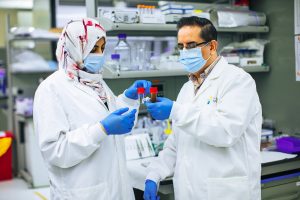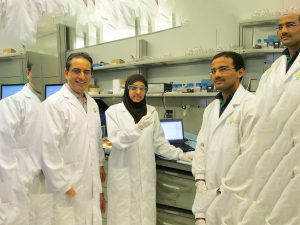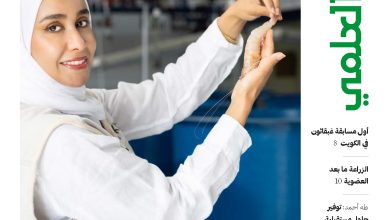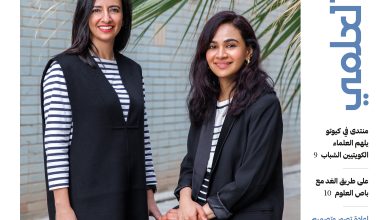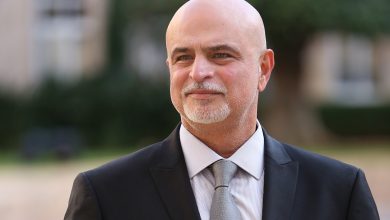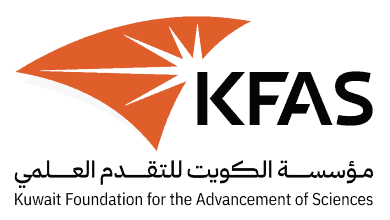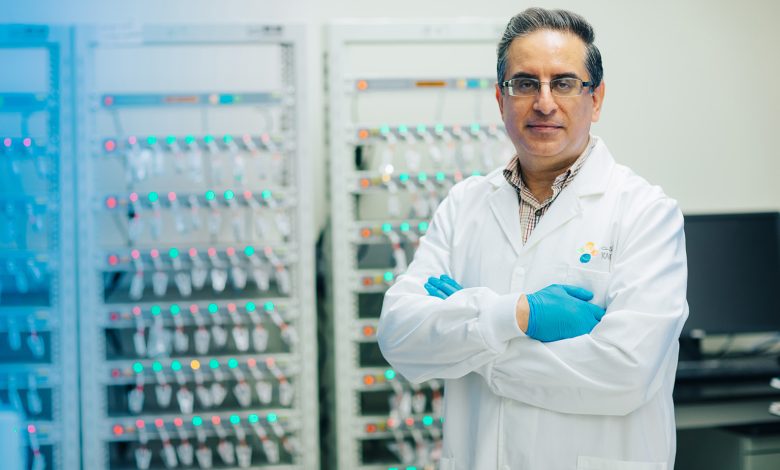
From a small ceramic and pottery shop in the Palestinian city of Hebron, Hussam Al-Sharif set out to master the basics of the profession practiced by his parents and grandparents, and then take his professional potential and graduate studies in the United States and Saudi Arabia to the horizons of creativity and innovation in materials science to become one of the world's leading researchers specialized in this vital science, and one of the academics whose in-depth studies are cited around the world.
The passion of that researcher for the profession of parents and grandparents prompted him to set off for the United States after completing his secondary stage in Palestine, to land at the New York College of Ceramics of Alfred University, where he obtained a bachelor's degree in ceramic engineering, and then continued his scientific ambition to obtain a master's degree in materials science and engineering from North Carolina State University in the United States, and then obtain a doctorate in that specialization from the same university.
He majored in materials science and engineering in the United States, worked for international companies, and landed at KAUST as an academic and distinguished researcher.
After graduating with his Ph.D., Dr. Al-Sharif went on to work as a postdoctoral fellow at Sandia National Laboratories in the United States. He then spent the next ten years working in the semiconductor industry at a number of major companies, such as Micron Technology and Texas Instruments. After two years on the faculty at the University of Texas in Dallas, Dr. Al-Sharif moved to the Arab world in 2009 to work in the Department of Physical Science and Engineering at King Abdullah University of Science and Technology (KAUST) in Saudi Arabia. University of Texas بدالاس، انـتـقل الـدكتـور الـشريف إلى الوطن العربي في عام 2009 ليعمل في قسم العلوم والھندسة الفیزیائیة بجامعة الملك عبدالله للعلوم والتقنية (KAUST) في المملكة العربية السعودية.
Renewable Energy and the Climate Crisis
Dr. Al-Sharif, who won the Kuwait Prize awarded by the Kuwait Foundation for the Advancement of Sciences (KFAS) in 2018, says that throughout the centuries-old history of mankind, man has been constantly moving from dependence on one form of energy to another. Humanity, for example, has moved from using wood as a primary source of energy to coal, then to fossil fuels, natural gas and nuclear power.
The current energy transition is driven not primarily by economic factors but by the climate crisis that threatens our existence on the planet.
In an exclusive interview with the journal Scientific Advances, Dr. Al-Sharif adds that this energy transition has always been driven by a number of economic factors and the need to provide access to energy for wider segments of the population with steady population growth, "but we are currently going through a different kind of energy transition; the current energy transition is not driven primarily by economic factors but by the climate crisis that threatens our very existence on this planet. The vast amounts of fossil fuels we burn have released large amounts of carbon dioxide emissions, which in turn have led to rising global temperatures and rising sea levels."
He warns that humanity will continue to pursue its diverse activities at this rate, because "many areas of our planet may soon become uninhabitable. This calls for governments and people around the world to take immediate action to reverse this trend to help us preserve our planet. Meeting this challenge requires significant and diverse efforts, including the adoption of new environmental and economic policies, changing our consumer behavior, technological innovations, and collaboration among stakeholders around the world."
Dr. Al-Sharif focuses his current research on the field of technological innovation, and believes that the current energy transitions should see efforts to develop sustainable energy sources such as solar and wind energy, carbon dioxide mitigation and conversion programs, energy storage technologies, green hydrogen, advanced cooling technologies, and recycling and reuse programs.
Researchers have made significant progress in deploying renewable energy generation devices such as solar and wind to generate electricity. Over the past few years, the price of electricity generated from solar energy has become cheaper than the price of electricity generated from fossil fuels. But one of the drawbacks of solar and other renewable energy generation technology, Dr. Sharif says, is that they are inherently unsteady: the sun doesn't rise at night and the wind doesn't blow every day. For this reason, these new energy sources must be coupled with energy storage systems such as batteries. The battery market is expected to reach about $500 billion by 2050. The truth is that without energy storage, humanity will not be able to harness the full potential of renewable energy systems.
Dr. Al-Sharif and his research team at KAUST are focused on developing advanced batteries for renewable energy systems. The batteries used mainly today are lithium-ion batteries. Over the past twenty years, these batteries have been a huge success in the field of portable electronic devices and are now transforming the automotive industry. However, it suffers from some disadvantages that are expected to worsen over time. The limited supply of lithium ion and its uneven distribution in the world has led to a significant increase in the price of lithium recently. In addition, lithium-ion batteries are inherently unsafe because they use flammable electrolytes. Also, if we want to completely eliminate carbon emissions from the electrical grid, using a lithium-ion battery as a storage solution is not possible due to its high cost.
Many areas of the world may soon become uninhabitable, calling for immediate action to reverse this trend to help us preserve our planet.
Dr. Sharif is currently working on "developing hydro-based batteries with many advantages over lithium-ion batteries. Aqueous electrolytes are safe, environmentally friendly, and cost less. The team members focused on the development of electrolytes and electrode materials – electrode – that provide high energy density suitable for grid-scale applications. We also focused in particular on zinc batteries, and made many breakthroughs in electrode and electrolyte design in this technology. In addition, the team worked on the development of Na ion batteries. Sodium is much more abundant than lithium and is present in large quantities in many places in the world. Saudi Arabia, for example, produces sodium as a by-product of the desalination process."
In addition, Dr. Al-Sharif is adapting the oil-derived carbon to be used as a material for making the anode for sodium-ion batteries. Although sodium-ion batteries have a lower energy density than lithium, they can be suitable for large-scale application because they are less expensive to manufacture. "I am working with the team on the development of micro-electrochemical capacitors to store energy on chips, which are integrated power units that can be used for autonomous sensors in IoT and sensor network applications."
Electronic Devices Materials
Dr. Al-Sharif worked for about ten years in the semiconductor industry sector in a number of companies, during which he contributed to the development of new materials and processes, many of which entered into the development of production volumes, which brought added value to these companies.
Dr. Al-Sharif focuses his research on the field of technological innovation and believes that the current energy transitions should witness vigorous efforts to develop sustainable energy sources.
"The semiconductor chips I developed were used in Sun Microsystems' servers, Nokia phones and personal computers for a number of other companies," says Dr. Al-Sharif.
Dr. Al-Sharif is currently working as part of a research team "to map the semiconductor roadmap in Saudi Arabia, especially after supply chain disruptions have made many countries realize that they need some form of original semiconductor industry, and we hope that this will usher in a new era in semiconductor products in the MENA region."
Materials Science Curricula
Dr. Al-Sharif's work at KAUST seems to have transformed his career: "I was fortunate to be involved in building one of the most successful materials science and engineering departments in the Middle East. Since joining KAUST in 2009, I have been involved in every aspect of curriculum design, faculty recruitment, internal regulations, and making our program participate in regional and global events. I am proud that our collaborative research network covers almost every part of the world, including the USA, China, Europe, Korea, Australia, the Middle East and Africa."
Dr. Al Sharif recently received further encouragement after several universities from across the region approached him for advice on setting up new materials science and engineering departments. Several programmes have already been established that bode well for this emerging field.
He believes that innovations in materials science can help us meet the enormous challenges before us in the world today. Water scarcity, high levels of carbon dioxide, pollution, renewables and personalized health care depend heavily on the availability of improved materials. Today's challenges are becoming increasingly difficult and require a multidisciplinary way of thinking. Through innovation and collaboration, we can deliver material solutions that will undoubtedly make meaningful progress in solving our toughest problems. Materials science is the biggest common denominator in many fields and applications, so we need to strengthen materials science institutions and attract aspiring and enthusiastic materials scientists.
Dr. Al-Sharif develops hydro-fuel batteries that have many advantages over lithium-ion batteries, especially because they are safe, environmentally friendly and affordable.
A Message to Future Generations
According to Dr. Al-Sharif, humanity is currently facing global problems that transcend geographical and political boundaries (in the fields of water, food, pollution and energy). Solving these problems requires that ambitious young scientists and engineers work together in genuine and effective collaborations. This is more important today than ever, along with dedication and hard work.
He sends a message to future generations that "everyone builds their own network. The network these days is your net worth. The most important asset you have after your degree is your network. Creating a strong and vibrant network of passionate friends and colleagues for materials science is one of the best tips I can give to students currently studying materials science. One of the best ways to build these networks is to volunteer and belong to the relevant communities at the regional and global levels. I've been fortunate to be part of the materials science community for many years, and this has allowed me to make many friends along the way."
We are working as part of a research team to draw a semiconductor roadmap in Saudi Arabia due to the urgent need for it, especially after the recent supply chain disruptions
On the role played by the Kuwait Foundation for the Advancement of Sciences (KFAS) and the awards it awards annually to Kuwaiti researchers and their Arab colleagues, Dr. Al-Sharif said: "I would like to extend my sincere thanks to the Kuwait Foundation for the Advancement of Sciences for the tremendous effort it invests in promoting science and scientists in the Arab world. Winning the Kuwait Award was one of the proudest moments in my career. This kind of encouragement and celebration of Arab scientists will serve as a catalyst for new generations to join the science and engineering community, which is essential to address the enormous challenges in our region and the world."
Abdullah Badran's dialogue
Biography and Career
- • Dr. Al-Sharif grew up in Hebron, Palestine. His grandfather and uncles ran pottery shops that later evolved into small local ceramic workshops. He mastered the craft of ceramics at the age of nine and worked for a short time on glazing and ceramic grilling.
- • He received his bachelor's degree in ceramic engineering from the New York School of Ceramics at Alfred University, followed by his master's and doctorate in materials science and engineering from North Carolina State University.
- • After graduating from his doctorate, he worked as a postdoctoral fellow at Sandia National Laboratories, United States. He then spent the next ten years working in the semiconductor industry at a number of major companies, such as Micron Technology and Texas Instrument.
- • He worked as a professor of materials science and engineering at the University of Texas Dallas.
- • In 2009, he began working at KAUST in Saudi Arabia, is a professor and principal investigator in the University's Nanomaterials and Functional Devices Laboratory, and served as the head of its Materials Science and Engineering Department.
- فاز بجائزة (الكويت) في عام 2018 عن أبحاثه في مجال تخزین الطاقة وابتكاره لأجھزة تخزین الطاقة مثل البطاریات والمكثفات.
- • He won the Kuwait Award in 2018 for his research in the field of energy storage and his innovation of energy storage devices such as batteries and capacitors.
- • He won the Abdul Hameed Shoman Award in 2015 for his research in energy, water and environmental technologies.
- • He won the 2018 KAUST Award for Excellence in University Teaching.
- • Fellowship in several international societies, including the American Physical Society, the Institute of Physics of the United Kingdom, and the Royal Society of Chemistry.
- • A researcher cited in materials science research, his research recorded more than 40,000 citations, while the citation factor (h-index) reached 107.
- • He has published more than 520 articles and obtained more than 70 patents.
- • He supervised 26 doctoral theses and six master's theses.

